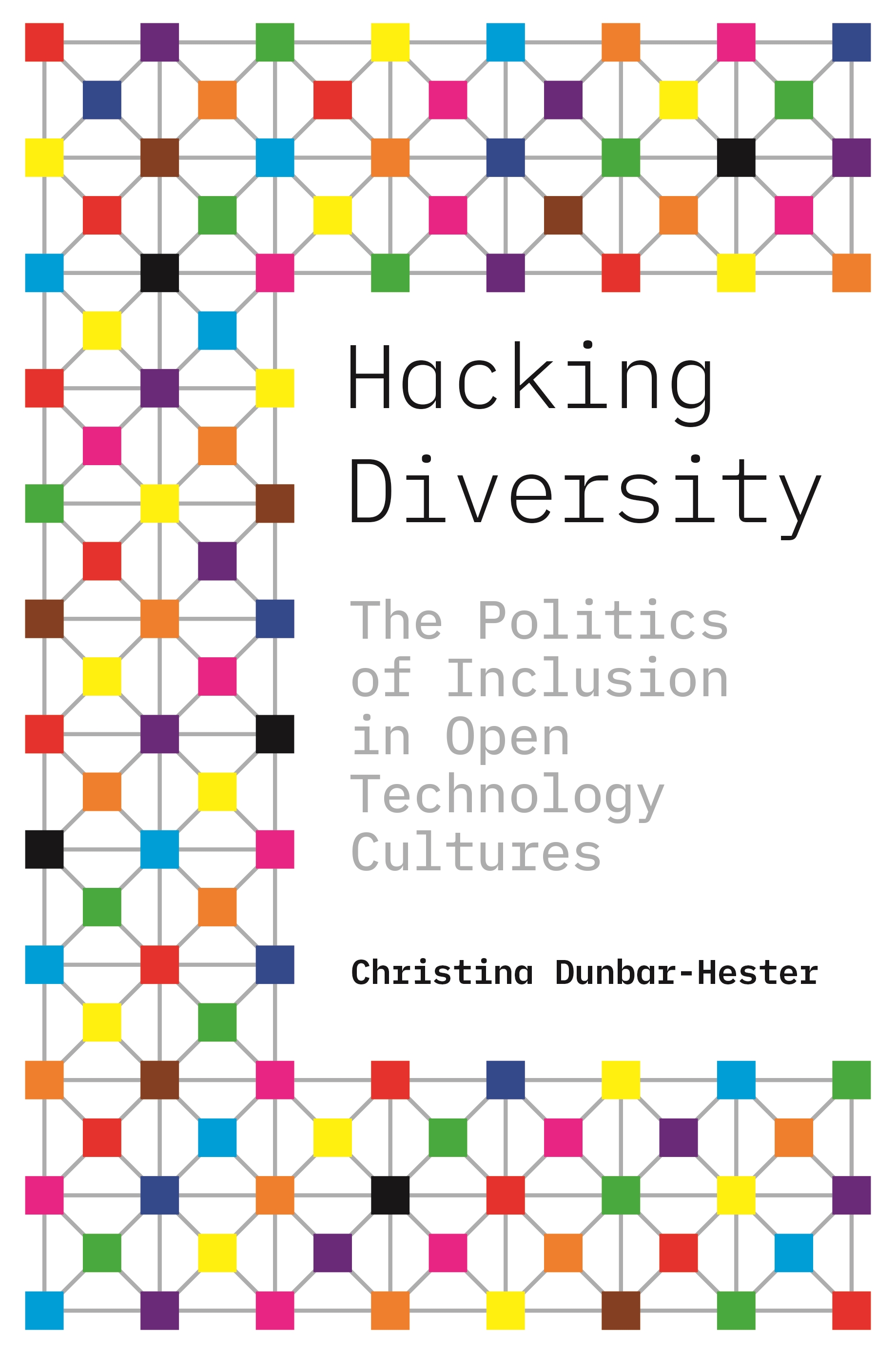Christina Dunbar-Hester: Hacking Diversity: The Politics of Inclusion in Open Technology Cultures (2020)
Filed under book | Tags: · care, community, computing, diversity, diy, ethnicity, feminism, floss, gender, hacker culture, hackerspace, hacking, identity, open source, openness, participation, politics, queer, race, technology, women

“A firsthand look at efforts to improve diversity in software and hackerspace communities.
Hacking, as a mode of technical and cultural production, is commonly celebrated for its extraordinary freedoms of creation and circulation. Yet surprisingly few women participate in it: rates of involvement by technologically skilled women are drastically lower in hacking communities than in industry and academia. Hacking Diversity investigates the activists engaged in free and open-source software to understand why, despite their efforts, they fail to achieve the diversity that their ideals support.
Christina Dunbar-Hester shows that within this well-meaning volunteer world, beyond the sway of human resource departments and equal opportunity legislation, members of underrepresented groups face unique challenges. She brings together more than five years of firsthand research: attending software conferences and training events, working on message boards and listservs, and frequenting North American hackerspaces. She explores who participates in voluntaristic technology cultures, to what ends, and with what consequences. Digging deep into the fundamental assumptions underpinning STEM-oriented societies, Dunbar-Hester demonstrates that while the preferred solutions of tech enthusiasts—their “hacks” of projects and cultures—can ameliorate some of the “bugs” within their own communities, these methods come up short for issues of unequal social and economic power. Distributing “diversity” in technical production is not equal to generating justice.
Hacking Diversity reframes questions of diversity advocacy to consider what interventions might appropriately broaden inclusion and participation in the hacking world and beyond.”
Publisher Princeton University Press, 2020
Princeton Studies in Culture and Technology series
ISBN 9780691182070, 0691182078
xi+271 pages
Reviews: Jenna P. Carpenter (Tech & Society, 2021), Rebecca Ortenberg (Lady Science, 2020), Samantha Shorey (International Journal of Communication, 2020).
EPUB (updated on 2022-8-29)
PDF (added on 2022-12-12)
D. Fox Harrell: Phantasmal Media: An Approach to Imagination, Computation, and Expression (2013)
Filed under book | Tags: · agency, artificial intelligence, cognition, computation, computing, epistemology, ethnicity, imagination, interface, meaning, media, metaphor, narrative, new media art, poetics, power, race, self, semiotics, subjectivity, technology, theory, video games

“An argument that great expressive power of computational media arises from the construction of phantasms—blends of cultural ideas and sensory imagination.
In Phantasmal Media, D. Fox Harrell considers the expressive power of computational media. He argues, forcefully and persuasively, that the great expressive potential of computational media comes from the ability to construct and reveal phantasms—blends of cultural ideas and sensory imagination. These ubiquitous and often-unseen phantasms—cognitive phenomena that include sense of self, metaphors, social categories, narrative, and poetic thinking—influence almost all our everyday experiences. Harrell offers an approach for understanding and designing computational systems that have the power to evoke these phantasms, paying special attention to the exposure of oppressive phantasms and the creation of empowering ones. He argues for the importance of cultural content, diverse worldviews, and social values in computing. The expressive power of phantasms is not purely aesthetic, he contends; phantasmal media can express and construct the types of meaning central to the human condition.
Harrell discusses, among other topics, the phantasm as an orienting perspective for developers; expressive epistemologies, or data structures based on subjective human worldviews; morphic semiotics (building on the computer scientist Joseph Goguen’s theory of algebraic semiotics); cultural phantasms that influence consensus and reveal other perspectives; computing systems based on cultural models; interaction and expression; and the ways that real-world information is mapped onto, and instantiated by, computational data structures.
The concept of phantasmal media, Harrell argues, offers new possibilities for using the computer to understand and improve the human condition through the human capacity to imagine.”
Publisher MIT Press, 2013
ISBN 9780262019330, 0262019337
xix+420 pages
Reviews: John Harwood (Artforum, 2014), Brian Reffin Smith (Leonardo, 2015).
Comment (0)Lisa Nakamura: Digitizing Race: Visual Cultures of the Internet (2007)
Filed under book | Tags: · ethnicity, gender, identity, internet, race, racial politics, virtual communities, visual culture

In the nineties, neoliberalism simultaneously provided the context for the Internet’s rapid uptake in the United States and discouraged public conversations about racial politics. At the same time many scholars lauded the widespread use of text-driven interfaces as a solution to the problem of racial intolerance. Today’s online world is witnessing text-driven interfaces such as e-mail and instant messaging giving way to far more visually intensive and commercially driven media forms that not only reveal but showcase people’s racial, ethnic, and gender identity.
Lisa Nakamura, a leading scholar in the examination of race in digital media, uses case studies of popular yet rarely examined uses of the Internet such as pregnancy Web sites, instant messaging, and online petitions and quizzes to look at the emergence of race-, ethnic-, and gender-identified visual cultures.
While popular media such as Hollywood cinema continue to depict nonwhite nonmales as passive audiences or consumers of digital media rather than as producers, Nakamura argues the contrary—with examples ranging from Jennifer Lopez music videos; films including the Matrix trilogy, Gattaca, and Minority Report; and online joke sites—that users of color and women use the Internet to vigorously articulate their own types of virtual community, avatar bodies, and racial politics.
Publisher U of Minnesota Press, 2007
ISBN 0816646139, 9780816646135
248 pages
Keywords and phrases
Asian American, visual culture, avatars, Internet, digital signatures, buddy icons, Minority Report, racial formation, African Americans, codetalkers, cyberpunk, Matrix trilogy, Details magazine, Jennifer Lopez, digital divide, posthuman, racial project, racism, However, Agent Smith
More info (publisher)
More info (google books)

